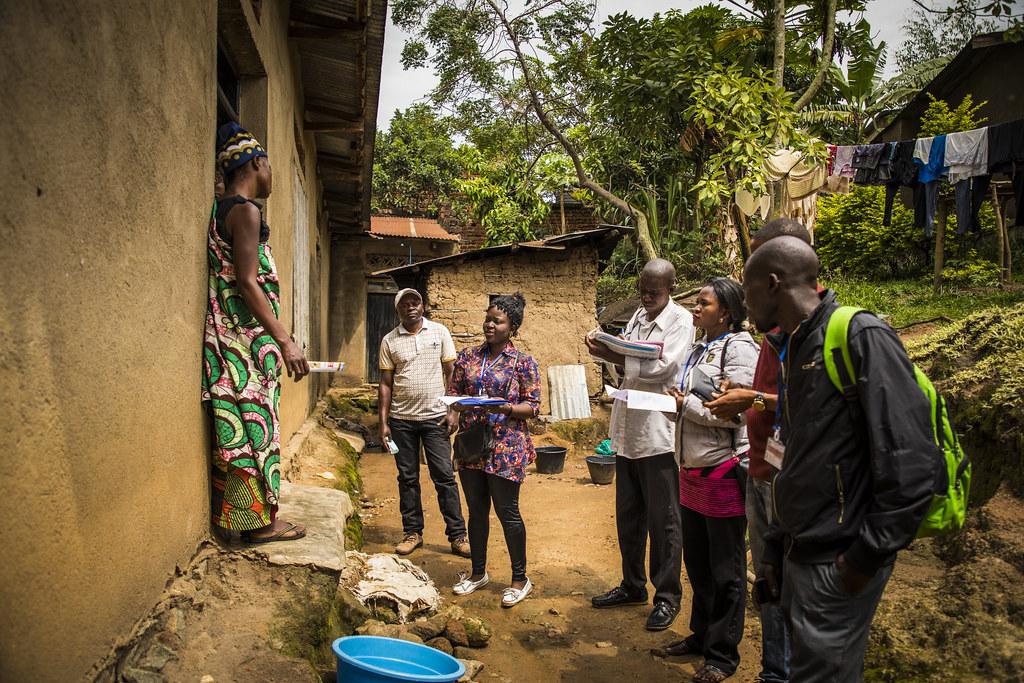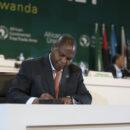Africa has a history of vaccine hesitancy but also of solutions to it

A poll in six African countries suggests 62% of people would get a COVID-19 vaccine if available. That wouldn’t be enough for population immunity.

Community representatives in Beni, North Kivu, DRC, spreading health awareness. Photo: World Bank / Vincent Tremeau
The discovery and development of vaccines has been one of the greatest public health achievements of the last few centuries. Thanks to vaccinations, once common illnesses such as polio, measles, diphtheria and rubella have been all but eradicated. Only clean water has had more of an impact in reducing the burden of infectious diseases.
From the very start, however, there has also been resistance. When the English doctor Edward Jenner invented the smallpox vaccine in 1798, it sparked a widespread anti-vaccination movement that raged on for over a century. Similar movements have continued since. In fact, even before the COVID-19 pandemic hit, the World Health Organisation (WHO) in 2019 listed “vaccine hesitancy” as one of the ten greatest threats to global health.
Africa has not been immune to these trends. Cameroon’s immunisation campaign in the 1990s was sabotaged by unfounded beliefs that vaccines would make girls sterile. Oral Polio Vaccination (OPV) initiatives were boycotted in East Africa in the 1990s and in northern Nigeria in the 2000s. A mass deworming programme was rejected in several regions of Ghana in 2007. 16 people were killed in 2009 in Mozambique after being accused of spreading cholera rather than preventing it. More recently, the trial of a COVID-19 vaccine in South Africa was met by protests and a Nigerian state governor falsely claimed the COVID-19 vaccine is designed to kill people.
In the wake of the coronavirus pandemic, vaccine hesitancy – “ the reluctance or refusal to vaccinate despite the availability of vaccines” – has become more important than ever, in Africa and worldwide. In a GeoPoll study conducted after the Pfizer-BioNTech vaccine was found to be over 90% effective, 42% of respondents in six African countries (Côte D’Ivoire, DR Congo, Kenya, Mozambique, Nigeria, and South Africa) said they would “definitely” get the vaccine as soon as possible. 20% said they would “probably” get it.
If this is representative, it would not be sufficient to achieve population immunity, which experts say would require 80-90% of the population to be immune. There is significant work to be done.
Tackling vaccine hesitancy
According to the WHO, vaccine hesitancy is influenced by factors such as complacency, convenience and confidence. These are some of the main reported worries with the COVID-19 vaccine in Africa. In the GeoPoll survey, the two main concerns raised were its safety (35%) and availability (27%).
African governments hoping to immunise their populations will need to tackle all these aspects of vaccine hesitancy, but perhaps the most challenging will be increasing confidence. Many concerns about vaccine safety are linked to misinformation, which contributes to a lack of trust in the health care system, pharmaceutical companies, and political institutions. Rebuilding public trust will take concerted and multi-faceted efforts.
Among other things, governments will need to communicate effectively and transparently regarding the full benefits and risks of vaccination. Health providers will need to be trained to ensure that they give relevant and comprehensible information in a respectful and culturally sensitive manner. Religious, political and other community leaders will need to be utilised to spread accurate information to their followers. Strategies will need to be devised to specifically target marginalised communities that may have less access to healthcare providers.
Fortunately, there are some positive examples African countries can draw on for inspiration. Nigeria’s use of community knowledge to transform its polio eradication strategy in 2012 offers a clear pathway to engaging communities at all levels – from leaders to traditional healers to families. In that initiative, over 12,000 volunteer community mobilisers were chosen for their trusted positions in their local communities. They provided mothers with information about polio vaccination but also other issues such as nutrition and hand-washing. This approach could be replicated across Africa to create COVID-19 vaccination programmes tailored to and integrated into existing community service programmes.
Governments can also use newer technologies. Given widespread mobile phone penetration, possible approaches could range from a simple text messaging system to a USSD-based notification system and GPS-enabled software that uses robocalls featuring voice recordings of influential community leaders.
Ultimately, no single strategy will be sufficient to improve vaccination rates. Reasons for hesitancy vary across time and place, and multiple targeted strategies will be needed, carried out in a coordinated way by several different agencies, healthcare bodies, communities and other parties.
Efforts will also need to be regional. Many borders are porous and population immunity will only be meaningful if efforts go beyond individual nations. Collaboration will be necessary and Africa’s eight Regional Communities (RECs) working together with the African Union (AU) may be essential in executing larger and better-resourced vaccination and communication campaigns.
Building for the future
There is alarming concern among scientists that destruction of biodiversity and climate change caused by human activities could awaken previously dormant pathogens like SARS-CoV-2 virus that have been as yet undetected by humanity. According to the WHO, the world has witnessed the emergence of several disease outbreaks and epidemics caused by more than 20 infectious agents over the past decade such as SARS, MERS, Ebola, chikungunya, avian flu, swine flu, and Zika.
Vaccination remains one of the most successful, cost-effective public health interventions. In tackling COVID-19 and going forward, the challenge is for African leaders and policymakers will be to design and implement effective vaccination policies – to always build population immunity – that will help combat future epidemic zoonoses that could sporadically occur anywhere anytime.







Please can we all agree that population immunity/herd immunity has never been achieved against the normal influenza that tours Europe all year round?
And that herd immunity of >80% will NOT be achieved for COVID-19 in any country, since the vaccine has only been approved for people above 16 years of age!
The vaccine is there to protect the elderly and sick from dying with COVID-19, and they should be immunised to protect themselves.
Do not let South African apartheid tragedy repeat itself by Dutch and Boer/ Engish inhfluence. Cowards claiming to be “well educated will lie to perpetuate mass deaths.
I just wrote to You and misspelled English and influence. I apologize.
There is still widespread racism and a vested effort to annihilate an entire culture. I pray for many African Doctors to be cautious of trusting “white” people on speaking on Africa’s behalf.
Read Donald Wood’s history or How Europe Underdeveloped South Africa or learn about the dangers white South did to a 85 percent Black Country.
There are “professionals” who will lie non stop and give nothing but false information, while trying to assure that “everything is under control and being researched, etc…”
I hope that INTERPOL and the United Nations can work together to root out Wolves in Sheeps’ clothing.
Dear author, population immunity or heard immunity is not the goal, also not in Europe, as the Covid-19 vaccine is only approved for people above 16 years of age. In many African countries, half of the population is below 15 years of age.
In Europe there are many elderly people, but still we will not be able to vaccinate >85% of the population, which is what is required to achieve herd immunity.
The vaccine is important for the elderly and vulnerable people who may die from Covid-19.
buy cialis online cialis coupon
plaquenil pill hydroxychloroquine for covid 19 what is hydrochloroquine